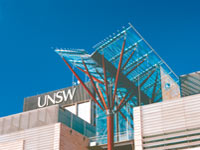Eng (Civil w Arch) (Hons) - 3635
Program Summary
Faculty: Faculty of Engineering
Contact: School
Campus: Sydney
Career: Undergraduate
Typical UOC Per Semester: 24
Min UOC Per Semester: 6
Max UOC Per Semester: 24
Min UOC For Award: 192
UAC Code: 425450
Domestic Entry Requirements: See Domestic Entry Requirements
International Entry Requirements: See International Entry Requirements
View program information for previous years
Program Description
The Civil Engineering with Architecture program provides for an appreciation of architectural principles and an understanding of both the architect's role in construction and the interaction between architects and engineers. The ultimate aim is to help students become conceptual thinkers, inspired by beautiful creations to build even better ones, to develop an appreciation for beauty with the mathematical ability to challenge the traditional boundaries of structural design. Students graduating from this degree will be well qualified to collaborate with architects and other professionals in the built environment to produce integrated and sustainable design. Creativity and inventiveness are the key attributes of this program.
In the final year of the program students may elect to major in structural engineering, geotechnical engineering, transport engineering, water engineering or engineering construction and management.
This program can be taken on a four-year full-time basis or on a part-time basis subject to the approval of the Head of School. Intending part-time students are advised that all courses are offered only in the daytime.
Program Objectives and Graduate Attributes
Rules
Program Structure
The timing of the elective courses may be modified to optimise the student's choice of courses. Generally courses are given only once a year. In addition, courses may have prerequisites and exclusions. Thus students should plan their enrolments carefully.
Please refer to the School's website for a suggested Year by Year program.
Civil Engineering Component(144 UOC)
Choose ONE of:
- MATH1131 Mathematics 1A (6 UOC)
- MATH1141 Higher Mathematics 1A (6 UOC)
- MATH1231 Mathematics 1B (6 UOC)
- MATH1241 Higher Mathematics 1B (6 UOC)
- PHYS1121 Physics 1A (6 UOC)
- PHYS1131 Higher Physics 1A (6 UOC)
- CVEN1300 Engineering Mechanics for CE (6 UOC)
- ENGG1000 Engineering Design (6 UOC)
Plus the following courses:
- CVEN3101 Engineering Operations (6 UOC)
- CVEN3202 Soil Mechanics (6 UOC)
- CVEN3203 Applied Geotechnics (6 UOC)
- CVEN3303 Steel Structures (6 UOC)
- CVEN3304 Concrete Structures (6 UOC)
- CVEN3501 Water Resources Engineering (6 UOC)
- CVEN3502 Water & Wastewater Engineering (6 UOC)
- CVEN4002 Design Practice A (6 UOC)
- CVEN4003 Design Practice B (6 UOC)
- CVENXXXX Research Thesis A
- CVENXXXX Professional Thesis A
- CVENXXXX Research Thesis B
- CVENXXXX Professional Thesis B
Choose Two Engineering Professional Electives (CVEN) (12 UOC)
Year 4 Engineering Professional Electives may be selected from the list on the School website (12 UOC)
Faculty of Built Environment:
Architecture Major (48 UOC)
- ARCH1121 Architectural Hist & Theory 1 (6 UOC)
- BENV1080 Enabling Skills (6 UOC)
(i) Architectural History
Academic Rules
Rules
Fees
Professional Accreditation
Progression
Substitution
Industrial Training
Area(s) of Specialisation









